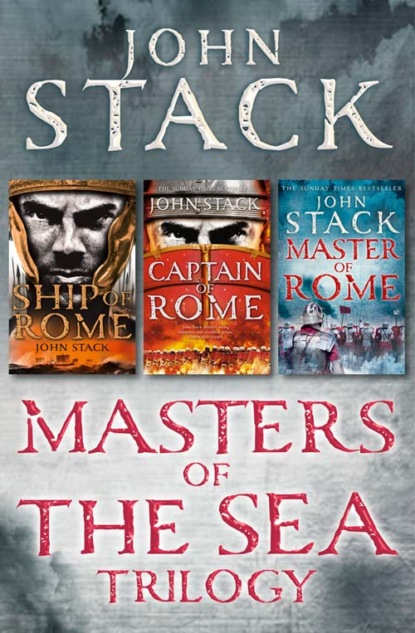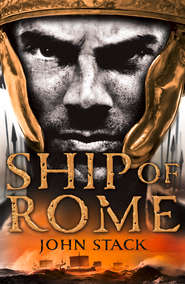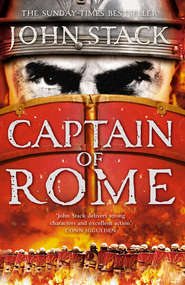По всем вопросам обращайтесь на: info@litportal.ru
(©) 2003-2025.
✖
Masters of the Sea Trilogy: Ship of Rome, Captain of Rome, Master of Rome
Автор
Год написания книги
2019
Настройки чтения
Размер шрифта
Высота строк
Поля
A cry to their left caused both officers to turn. Another legionary had been hit, the arrow finding the break in armour between breast and neck. The men around the fallen soldier bristled with anger at the sight, their exposed position offering no chance to repay the enemy in blood. Instinctively they took a step forward towards the copse, each man yearning for the command to advance and charge the Carthaginian position.
Marcus sensed their mood and reasserted his command, dispatching men to cover the horses of the wagon fifty yards behind. The tortoise formation withdrew slowly, gathering up their wounded as they did, using upturned scutum shields as stretchers for those who couldn’t stand. The rain of arrows continued to punish any man left exposed in the formation. The maniple formed around the wagon, the meagre catch of dead animals thrown away to make room for the wounded. Men of the IV lay with soldiers of the VII, the shared fight and blood spilt casting aside previous loyalties to form new bonds.
The maniple moved off slowly, their shields constantly charged against the threat of arrows or a renewed attack. Marcus ran his gaze over the rise before him, his sword sheathed, his hand pressed against his shoulder to stanch the flow of his blood. Romans and Carthaginians lay dead together, their overlapping corpses mocked by Pluto, who respected neither rank nor race, the god of the underworld counting them only as dead men for his charge. Marcus counted over a dozen fallen Roman warriors, men who had stood where others might have fled. The wagon to his back contained a dozen more, the boards of the wagon already soaked with their blood, a steady stream that marked their passage over the road to Makella.
Once out of range of the copse, Marcus ordered the maniple to increase to double-quick time, the intensified pace chewing up the ground beneath their feet. The road behind them remained empty, Marcus knowing that pursuit was unnecessary. The enemy had made their point. The area around Makella was Carthaginian territory and a Roman maniple alone outside the encampment was no longer safe. From here on the Ninth Legion had two choices. Either stay in the camp and starve or come out in full force. There was no middle ground.
CHAPTER TEN (#ulink_71565e50-2b1e-5a65-a2ee-e028690d054e)
Septimus walked out into the sunlit courtyard half an hour after dawn to find his mother, father and Atticus already there. The captain was mounted on one of the mares from the newly formed barracks at Fiumicino. She had all the hallmarks of a military horse, broad in the chest and barrel with a servile expression that bore witness to the hard life she led. Septimus paused and took a moment to study his friend closely, unsure of how he now felt. His sister’s abrupt end to the evening had left his challenge to Atticus unsaid, and now as they waited for Hadria he found himself re-examining the lingering gazes he had witnessed between them, the memory making him uneasy.
Hadria appeared at the door a moment later and paused before walking out into the courtyard. Her gaze was on Septimus as she walked towards him, her emotions in turmoil at the imminent departure. From the corner of her eye she sensed Atticus staring at her intently, and she struggled not to return his gaze, knowing that to do so would reveal her heart to her brother. She reached for Septimus and hugged him tightly, her eyes welling with tears, a silent prayer passing through her mind for his safe return and for that of the man she could not hold. As she broke her embrace she sensed Septimus’s eyes searching her own and resolutely returned his gaze although her heart called out for one last look at Atticus.
Salonina suddenly began to wail, her fears for her son surfacing in a wave of emotion, and Septimus turned to her. She hugged her son ardently, whispering a hope for him to be safe, and Hadria noticed that Septimus’s complete attention was on his mother. She seized her chance and turned her head towards Atticus. For a heartbeat their eyes locked and passion swept between them. Hadria silently mouthed a message, unseen by all except Atticus, before she whipped her head around as Septimus broke his mother’s embrace. He shook his father’s hand once more and mounted his horse.
Atticus spurred his horse and rode out into the busy street, his eyes locked forward, not daring to look over his shoulder as he heard Septimus fall in behind him. The horses quickly settled into an easy gait, Atticus unconsciously steering his mount through the growing throng as the city came to life. His mind was flooded by visions of Hadria and what he had just witnessed in the courtyard. The confusion he had felt the evening before when she abruptly retired to bed was swept away by the message she had mouthed, a message so fleeting that he had almost missed it. But now, as he replayed the moment in his mind, he was sure not only of what she had said but of how she felt, for her message was, ‘I must see you again.’
Thirty minutes later the two riders were once more on the Via Aurelia heading northwards towards Fiumicino. Atticus was anxious to learn more about Hadria; as the previous confines of the city had kept them riding in single file, making conversation impossible, he now let the pace of his horse fall off, allowing Septimus to catch up and ride abreast.
‘We should be back in camp within twenty minutes,’ Atticus began, breaking the silence, wanting to broach the subject of Hadria indirectly.
Septimus nodded, his own thoughts guarded, but also on Hadria. He had decided during the thirty-minute ride through the city that he needed to confront Atticus, to forestall any intentions he might have regarding Hadria.
‘Atticus, by law Hadria must remarry within the year,’ he said bluntly, turning in his saddle so he could face his friend.
‘I know, Septimus, your father mentioned it on my last visit,’ Atticus answered warily, taken aback by Septimus’s unexpected comment.
‘Then you realize she cannot entertain advances from anyone other than a suitor.’
‘What are you saying?’ Atticus asked angrily, knowing the answer implied in Septimus’s comment.
‘I saw the way you were looking at her,’ Septimus shot back, his gaze hostile as he reined in his horse, ‘and I’m telling you to stay away from her.’
‘And why couldn’t I be a suitor?’ Atticus stormed, bringing his own mount to a halt.
Septimus was on the cusp of revealing the reason behind his demand when he realized how weak and pathetic his motive was. He was suddenly overwhelmed with shame and his pride made him angry at Atticus for putting him in this situation.
‘You could never marry her, Atticus,’ he spat.
‘Why?’
‘Because you’re not suitable,’ Septimus shouted, his words now twisted to suit his purpose.
There was a moment’s silence as Atticus recoiled. ‘Why?’ he shouted again, his horse shifting restlessly as he leaned out of his saddle, his face inches from Septimus’s.
‘Because you’re not Roman,’ Septimus countered, his own anger rising uncontrollably. ‘Hadria must marry someone of her class, an equestrian from a Roman family.’
‘Maybe Hadria should decide that for herself,’ Atticus said.
Septimus wheeled his horse to separate the two mounts before turning one last time to face Atticus.
‘I wanted to ask you, Atticus, but now I’m telling you,’ he said, his face a mask of determination. ‘Stay away from Hadria!’
Septimus spurred his horse and he galloped away, barging past slower travellers on the busy road, their irate shouts ignored.
Atticus could only watch him leave, his anger washing over him at what had just occurred, at how foolish he had been to think that Septimus was different from the arrogant Romans who believed they were above all others.
‘We need to lure them out, make them commit some of their fleet to an opportunity they cannot refuse.’
‘And then?’ Gisco asked.
‘Then we take them. We capture their force and learn their true strength.’
The admiral nodded, agreeing with Hamilcar’s logic. What they needed now, needed most of all, was information. The enemy were building a fleet, that much was known. What was unknown was what type of ship the Romans would deploy, when they would launch and how many there would be.
Gisco knew the Romans were aware of his fifty ships, the galley that escaped them in the Strait of Messina having surely reported their strength, with the loss of their transport fleet confirming that presence. He was confident that they did not know of the second fleet of sixty that had sailed up the west coast, but he could not be sure and he had learned early in his military career that – when making plans – it was best to assume the worst. He would assume they did know. The final piece, a piece he was sure no one knew, was that he had persuaded Hamilcar to return to Carthage to call up a third fleet, the home fleet of the sacred city of Carthage herself.
Gisco closed his eyes and pictured the Roman galley he had seen in the Strait of Messina. The sight before him made him clench his teeth in anger, but he swept the emotion aside and concentrated on the details. She had been a fast ship, faster than any trireme in the Carthaginian fleet, although she would be no match for a quinquereme, whose fourth row of oarsmen would give her enough speed to overtake any smaller vessel. Was she typical of the Roman fleet? Did they possess any quinqueremes of their own? Would the new fleet be a mix of the two? Her design had been lighter than his own vessels, the reduction in weight and smaller draught making her faster over the waves. Would the Romans use a heavier design to better match his ships? Had they found out the secrets of the Carthaginian design, the new concepts employed by the master craftsmen of the Punic empire that had allowed the Carthaginians to combine strength and speed? If they had captured any of his ships then those secrets would be laid bare before any trained eye. The fleet had lost four ships since arriving in northern Sicily, three in a squall while travelling from Panormus to the blockade, and Boodes had reported the loss of a galley sent on patrol a week before. Had she also been lost to bad weather or had the Romans captured her? There were too many unanswered questions and the frustration of uncertainty caused Gisco to stand up and begin pacing the room.
Hamilcar watched him pace, studying him anew. Three days before he had agreed, at Gisco’s persistent request, to sail to Carthage to commandeer the home fleet. It was a request that only a Council member like his father could grant, and Hamilcar was acutely aware that Gisco was attempting to use Hamilcar’s contacts on the Council to serve himself. By personally requesting the fleet on Gisco’s behalf, Hamilcar also knew he was tying his fate to that of the admiral’s. He had initially resisted, reluctant to intertwine his destiny with Gisco’s, but had finally relented when he realized that Gisco’s request served the greater needs of Carthage. The Carthaginians were a maritime people, a nation at home on the water. The navy was the strength and backbone of that empire and Hamilcar realized it was time for the city to flex that power.
‘So how do we lure them out?’ Gisco asked suddenly, turning towards the seated Hamilcar to find the man already staring at him.
‘We use the same tactic our forefathers used against Agathocles, the tyrant of Syracuse. We offer them a city,’ Hamilcar replied, the idea having been formed, developed and tested in his own mind over the past few days.
Gisco smiled at the simplicity of the idea, a tactic that had worked against a different enemy over forty years before. Agathocles, then ruler of Syracuse in the southwestern corner of Sicily, had broken the uneasy truce of the time by attacking and taking the Carthaginian stronghold of Messina. The Carthaginians held only one other stronghold on the island, the city of Agrigentum in the west. The Carthaginian leader Maharbal did not have sufficient forces to fight his way across the entire island of Sicily to regain Messina, and so he devised a plan to make the enemy come to him. He offered Agathocles the city of Agrigentum.
One of the city councillors had presented himself before Agathocles, claiming the inhabitants were ready to rise up against their Carthaginian oppressors. The leader of Syracuse had immediately taken the bait and led his army across the island to liberate Agrigentum, only to find the gates locked against him. In his anger he besieged the city, even though he was over a hundred miles from the safety of his own territory. It was the mistake Maharbal had hoped for. The Carthaginian leader swooped down with his army to surround the enemy, trapping them between his forces and the hostile city.
The resulting battle had been a disaster for Agathocles, undone by his own greed and recklessness. Gisco was confident the Romans had the first trait in abundance, for why else would they have built their Republic if not to satisfy their appetite for the lands and wealth of others. But were they reckless? Gisco ran through the list of Carthaginian-held cities in his mind. He smiled as the perfect match for his purpose presented itself. Gisco would not need to rely on the Romans being reckless, for the city he chose would appear easily within their grasp. It was a city located on an island off the northern coast of Sicily, an island far removed from the blockade and any visible threat from the Carthaginian navy. It was the city of Lipara.
Gaius Duilius sat patiently as the camp prefect of Fiumicino made his report to the Senate. The battle-worn ex-centurion looked oddly out of place in the hallowed inner chamber of the Curia; however, he showed no sign of being intimidated by the surrounding senators. Duilius surmised that Tuditanus had faced more menacing foes over the course of his military career than this group of languid old men.
The junior consul’s mind wandered as the prefect outlined the progress of the fleet’s construction. Duilius already knew the main details of the report. Not by virtue of having seen Tuditanus’s written work, but from the reports of half a dozen spies in the camp who fed him updates both day and night. For that reason Duilius had not been to the camp, although he was fully aware of Scipio’s visit the day before and the thought made him turn to the senior consul now seated in the centre of the bottom tier of the semicircular rows. His attention returned to the present as he picked up an inaccuracy in the report.
‘Prefect,’ Duilius said, his interruption stopping Tuditanus in his tracks, ‘did you say the first batch of twenty galleys will be ready in six days?’
‘Yes, Senator,’ Tuditanus replied, his voice confident.
‘No sooner?’ Duilius asked, with an implied disbelief hidden beneath the seemingly innocent question.
‘No, Senator. Six days.’
Tuditanus held the junior consul’s gaze. He had been warned by Scipio to expect the question, the senior consul knowing that in a camp the size of Fiumicino there would be few secrets, and certainly none that would escape Duilius.
‘I see,’ Duilius said finally. He stood up.
‘Senators,’ he announced, ‘I humbly ask the senior consul, in your presence, to allow me to take the fleet to sea once it is ready.’









